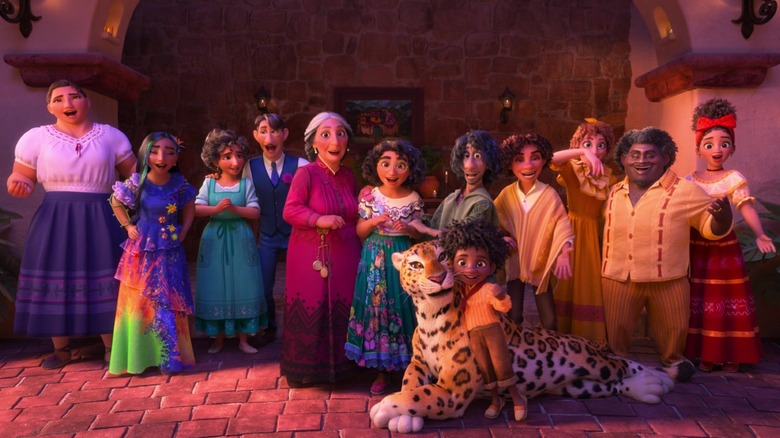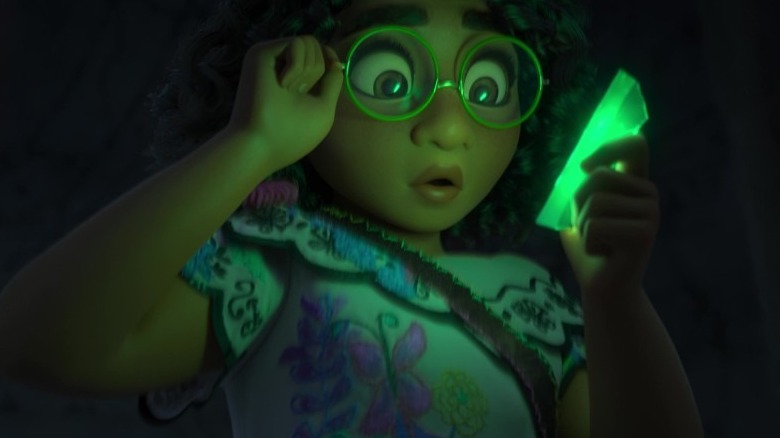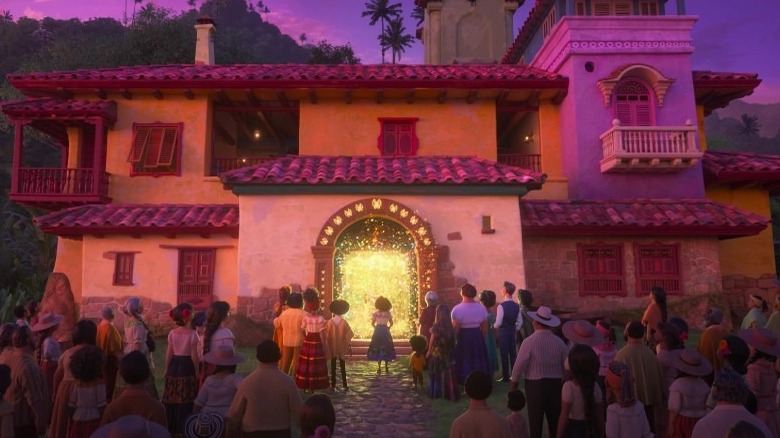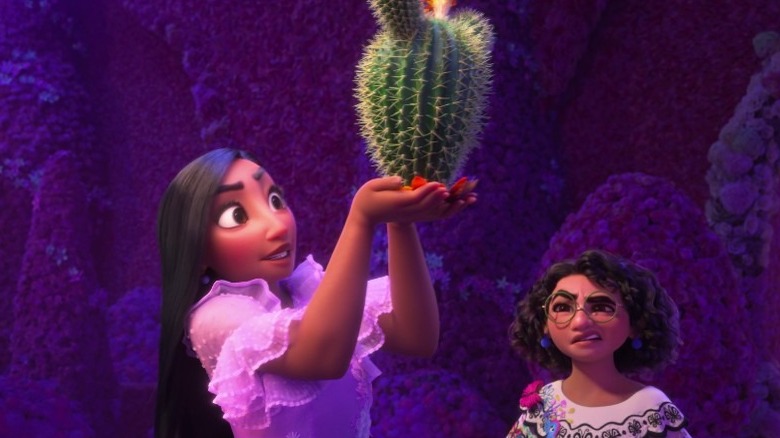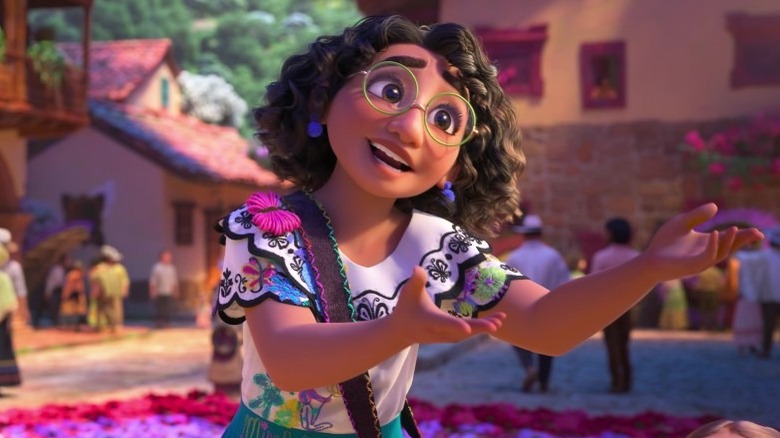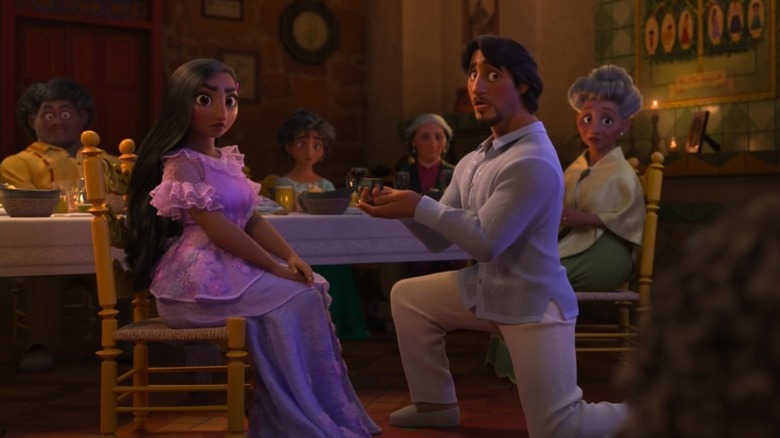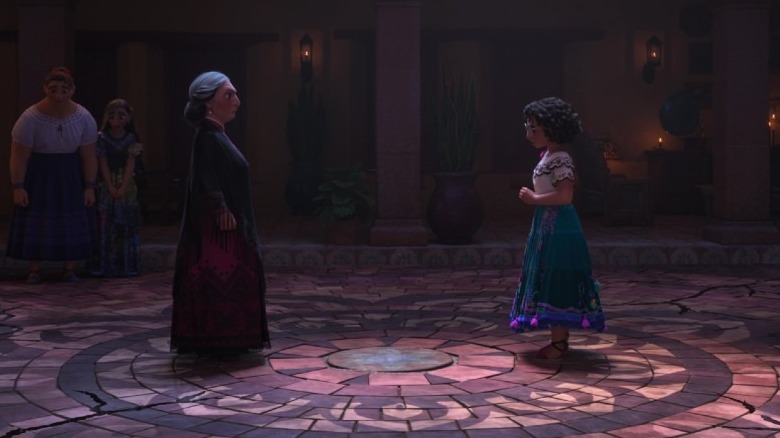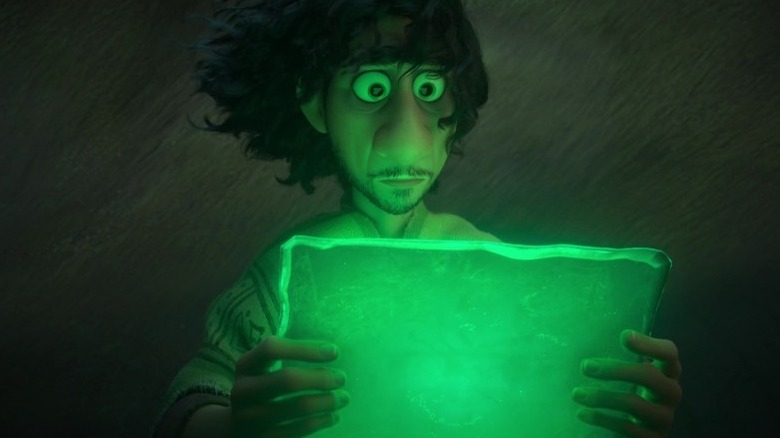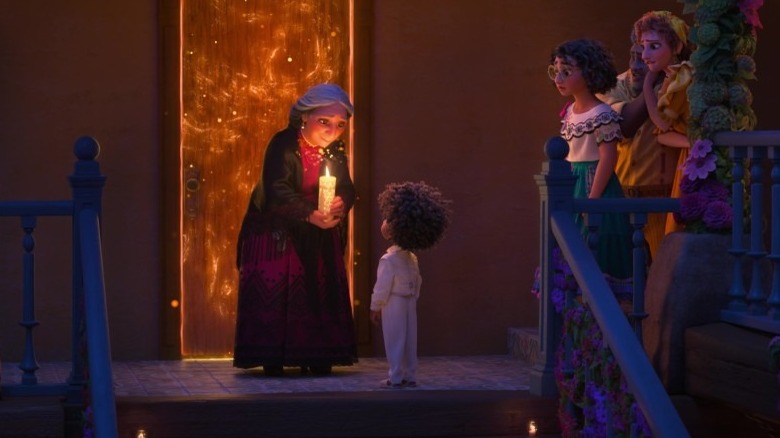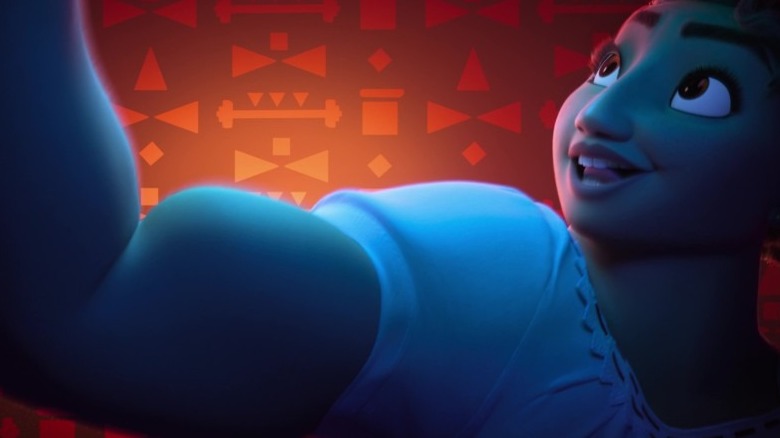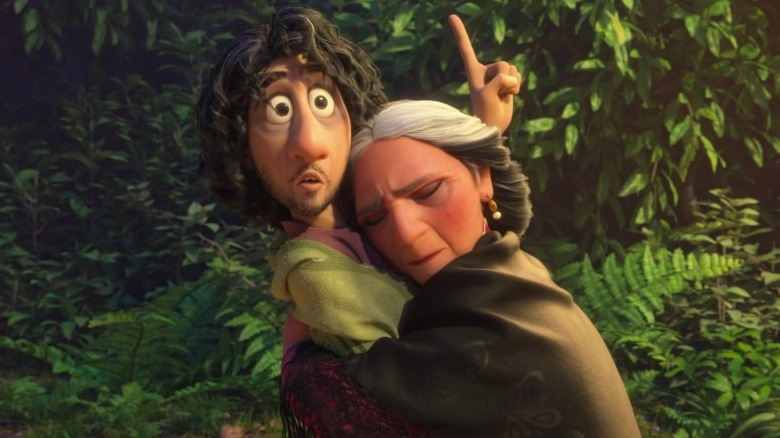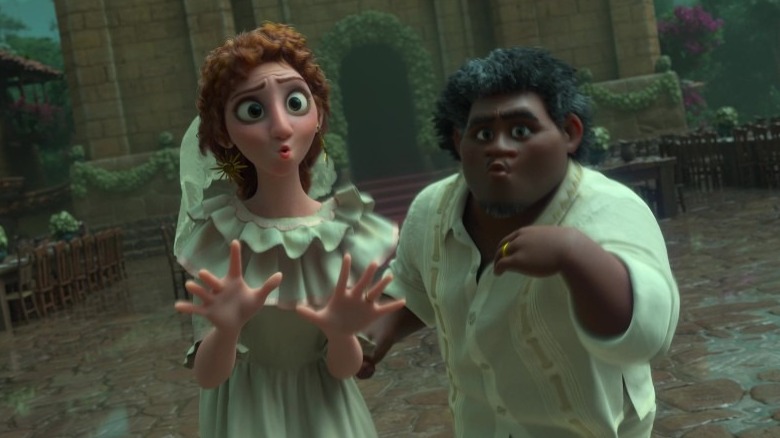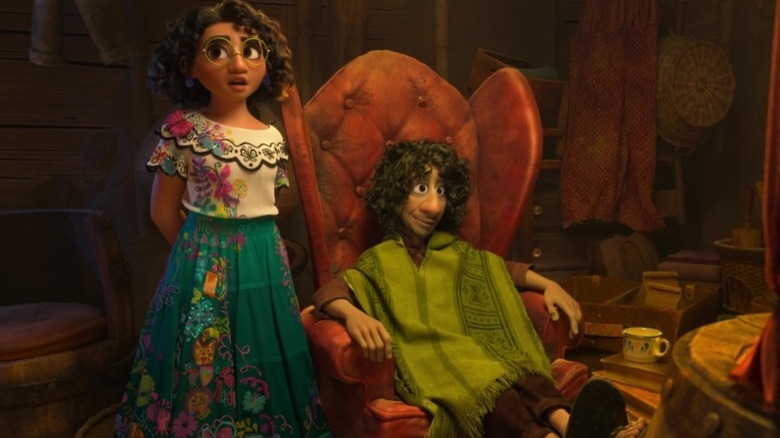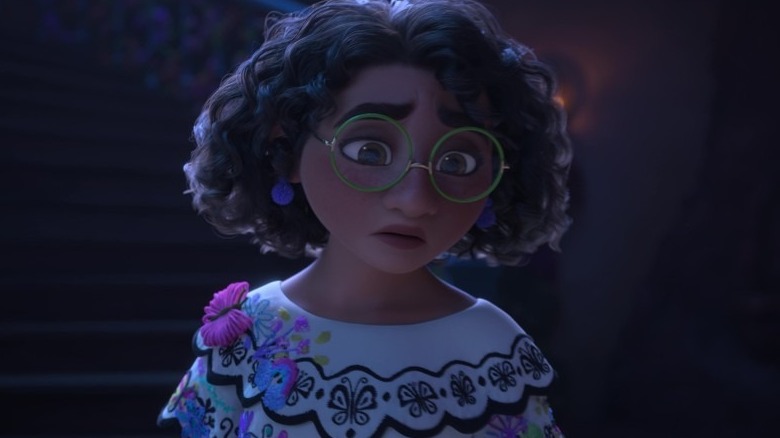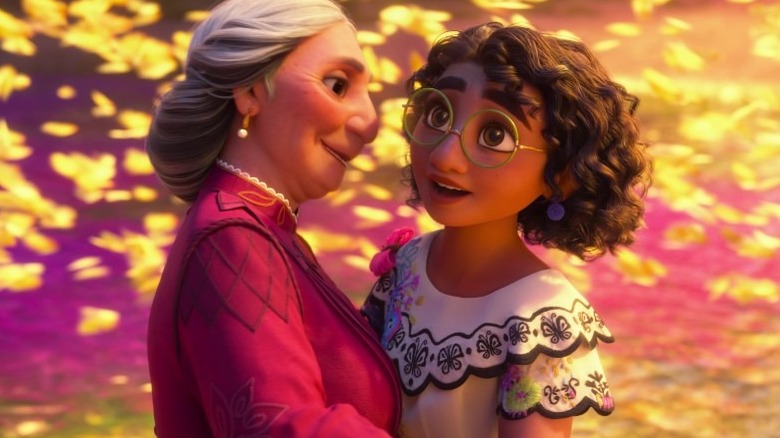The 14 Best Moments In Encanto Ranked
"Encanto" pulses with a tremendous amount of heart. It's among Disney's most enchanting offerings in recent years — largely because of its immersive animation and musical vibrancy. The animated feature is co-directed by Byron Howard and Jared Bush (who co-wrote the screenplay with Charise Castro Smith) and depicts the struggles and triumphs of the Madrigal family. Through the course of the film, a young Mirabel, voiced by Stephanie Beatriz, learns to cope with being the only family member without a special gift or talent. Her inward journey is as important as the outward one, as she uncovers the truth about her mysterious Uncle Bruno and her Abuela's tragic past.
With original songs written by Lin-Manuel Miranda, known for such blockbuster musicals as "Hamilton" and "In the Heights," "Encanto" offers up a rich thematic exploration of family, forgiveness, community, and love. Paired with its striking visuals, the feature, described as "an often beautiful film to look at," has something for everyone. The cast is truly star-studded and includes Diane Guerrero, Wilmer Valderrama, and John Leguizamo in key roles.
In revisiting "Encanto," we take a look at the film's 14 best moments, including many of its musical performances, with weight given to emotional pull, narrative significance, and crucial character beats. Check out our ranking below.
14. Bruno's Tower
During Antonio's (Ravi Cabot-Conyers) much-anticipated gift ceremony, Mirabel (Mira for short) witnesses a series of cracks splintering throughout the casita, threatening to tear it to shreds. The miracle candle's flame also flickers, sending chills down her spine. Mira scrambles around to try to stop any more cracking and cuts her hand. It's unclear whether what she witnesses is real or is simply a vision, as her family doesn't see any of the damage. Abuela ignores her concerns, so she decides to break into Bruno's derelict tower to uncover the truth. Upon climbing a seemingly endless spiral staircase, Mira is faced with a bottomless pit. She tosses a tattered rope across the chasm and climbs across. It's an admirable effort and a true showcase of her fortitude. She eventually comes across a collection of broken shards, all pulsing green. When pieced together, they reveal Mira at the center of one of Bruno's visions or prophesies. Looking out for her wellbeing, her father urges her to forget all about what she saw. But if she did that, we wouldn't have much of a story.
13. 'All of You'
"All of You" is a celebration of strength and community. "We've seen how brave you've been," sweetly sings Luisa and Isabela. The grand finale bookends Mira's entire character arc from unseen and unheard outcast to admired heroine. With the casita in rubble, the Madrigal family looks on unsure what to do next. Mira bursts into song, conjuring up a new sort of magic to rebuild the family home. The surrounding village people also come to the rescue. "We have no gifts, but we are many. And we'll do anything for you," the ensemble vows in song.
Mira is also gifted a specially-crafted door knob which she attaches to the new structure, sealing the casita with a love only earned through great endurance. "I see me — all of me," she sings, a bit teary-eyed. "All of You" is not only about an unwavering support system; it underscores the importance of self-worth and self-love. It's a magnificently charming finale sure to melt your heart.
12. 'What Else Can I Do?'
Bruno's vision quest reveals that the key to saving the miracle lies with Mira's ability to forgive. She's harbored resentment for years against her sister Isabela, whose gift is the perfect life. But perceptions aren't everything. When Mira goes to confront her sister, we peek behind the curtain of the relationship and soon learn how much pressure is placed upon Isabela to be a picture-perfect emblem for the family. "What Else Can I Do?" is Isabela's glorious moment, and her power to grow flowers leads her to create cacti out of nothing. It's the perfectly imperfect flora that's she's longed for, and it causes a whole new ecosystem to flourish inside the casita — much to Abuela's chagrin.
"Can I deliver us a river of sundew? Careful, it's carnivorous, a little just won't do / I wanna feel the shiver of something new / I'm so sick of pretty, I want something true, don't you?" ponders Isabela. The entire scene is one long exhale. All the pent up anger escapes the room, opening up the story for an exciting third act. Isabela and Mira still have more mending to do to their relationship, but it's a good start.
11. 'The Family Madrigal'
The opening song is crucial to setting up the story and tone of any musical. "The Family Madrigal" excels as an exuberant piece of music (one of Mirabel's biggest moments), as well as an appropriate introduction to a vibrant, magical storybook and its many characters. "This is our home, we've got every generation / So full of music, a rhythm of its own design," Mira sings with zest. Paired with the opening scene in which we learn of the miracle bestowed upon the family, it's an impressive initiation into a miraculous, inspiring world.
"There are so many people!" a very caffeinated Cecilia proclaims, acting as an audience stand-in. Mira quickly offers a rundown of the most important players — including Cousin Dolores, Camilo, and her older sisters Isabela and Luisa (Jessica Darrow) — and their respective gifts. Despite not having a gift or talent herself, a fact she tries her best to conceal from everyone, Mira has a big heart that more than makes up for it.
10. The dinner scene
Mira returns from her adventure in Bruno's tower a little shaken from the revelatory vision. She rushes to piece together the neon fragments to gain further insight into what it could possibly mean. A hushed conversation with her father, who suggests hiding the truth, is no match for her cousin Dolores and her superhuman hearing.
That evening, a very special dinner is held to celebrate Mariano's marriage proposal to Isabela. The meal is lavish with only the best food and drink, but things quickly go awry when Dolores can't help but gab to the other family members. Abuela is none too happy, of course, but attempts to keep the night on track. Adding insult to injury, Luisa also expresses a feeling of "weakness" as she tries to move the grand piano to no avail.
Doubt in the family miracle is insidious and manifests itself in yet another attack on the casita. This time, the destruction escalates into utter bedlam, and the family has no reason to believe Mira is not responsible. Pepa (Carolina Gaitán), who is gifted with the ability to control the weather, allows her emotions to get the best of her, and an unstoppable monsoon consumes the family home. As the film's turning point, the dinner scene presents the dire stakes in which the Madrigal family is intertwined.
9. Abuela and Mira come to blows
Immediately following "What Else Can I Do?" the casita is fully engulfed in flowers. Abuela confronts Mira in one of the film's most emotionally-charged scenes. The fact she doesn't have a gift of her own is "not an excuse to hurt this family," the matriarch seethes. "I'll never be good enough for you..." Mira replies, trailing off.
Aghast, she stands aback, feeling as though a self-fulfilling prophecy has indeed come to pass. All the resentment she has felt for herself and her family has reached the ultimate tipping point. For her part, Abuela fails to see that old ways of thinking and her own deeply-rooted pain has caused irreparable damage within the familial ranks. Now, it could very well be too late. Still, this moment serves to propel Mira further into her search for the truth and to uncover her own warrior-like inner strength.
8. Bruno's vision quest
Once Mira discovers Bruno still living within the casita's walls, she urges him to perform a ritual to conjure up the long-buried vision. In doing so, she explains, she can gain a clearer idea of how and where she fits into the bigger picture. Bruno takes the broken vision, pieces it back together, and summons a physical manifestation. At first, the vision (as you'd expect) traces out exactly what Mira already knows, but Bruno pushes forward and a new element emerges. A golden butterfly soars within the dazzling, swirling clouds of magic, leading Mira to see two figures. The two dark shapes morph into her and her sister Isabela, and they embrace. Upon first glance, it doesn't make much sense, but it soon becomes evident what she must do: seek reconciliation with her sister. Mira's role is to give unconditional love, forgiveness, and empathy. Only she can she save her family from ruin. In turn, Isabela must confess her true feelings about her gift and the perfect life.
7. Antonio's gift ceremony
Early on, Mira discovers a very nervous Antonio hiding beneath his bed. His much-anticipated gift ceremony rapidly approaches, and he is terrified of what his gift may be. Mira gives him a heart-warming pep talk, and his spirits are considerably lifted. Later, the family throws a lavish party to celebrate, and despite the camaraderie, Antonio is still unsure. "I need you," he squeaks, extending out his hand for Mira to accompany him to the top of the stairs. A golden, magic door emblazoned with his name stands before him. He reaches for the bright, magical doorknob, turns it, and awaits his fate. A chatty, vibrantly-colored toucan abruptly alights upon his arm. With the arrival of a massive herd of various wild beasts to his side, his gift to talk to animals is revealed. Flashbacks to Mira's own gift ceremony are interspersed, underscoring her feelings of exile in her family. It's both a joyous, lighthearted occasion and an isolating one — instilling the viewer with an understanding of the emotional gravity of the story.
6. 'Surface Pressure'
There's a reason Luisa's solo performance has now entered the Billboard Hot 100 chart. Both electrifying and poignant, "Surface Pressure" contains an undeniable melody and hook made for radio, and Jessica Darrow's vocal is immediately striking. Within the context of the film, the empowerment anthem soundtracks Luisa going about her daily chores and displaying her gift of superhuman strength with feats ranging from literally moving a church to transporting a handful of donkeys to market. Over a sultry rhythm, she expresses a strong understanding of self and identity: "I move mountains, I move churches / And I glow 'cause I know what my worth is," she sings. Aside from her unparalleled physical abilities, it's her personality that has endeared her to global audiences.
But she's under no delusions. In the second verse, Luisa notes the pressures put squarely on her shoulders and considers what her value would be without her bulging muscles. "Under the surface / I'm pretty surе I'm worthless if I can't be of servicе," she sings. Luisa embodies the human spirit and how we all struggle with self-worth.
5. Bruno and Abuela reunite
Through its entire runtime, "Encanto" builds a narrative surrounding Bruno and the fact we're not supposed to talk about him 一 ever (there's an entire musical number dedicated to it, after all). The black sheep of the family, Bruno has been cast aside due to his visions of bad luck and ruin, but he slowly comes back into the fold through Mira's own journey of truth and self-discovery. In the third act, it all pays off once we learn the burden Abuela has carried for decades. Personal tragedy led her down a dark, lonely path, and as a result, she pushed her family away and held them up to unrealistic expectations. In an all-too-brief scene, Abuela finally reunites with Bruno. They share a quick, loving embrace, and Abuela yanks him atop their trusty steed to head back into town. If you blink, you may miss one of the film's quieter but most touching moments.
4. 'We Don't Talk About Bruno'
Speaking of Bruno, saying his name is apparently forbidden. This mysterious figure casts a dark cloud over much of the film. In "We Don't Talk About Bruno," a Hot 100 hit nearing "A Whole New World" levels of iconic, Pepa and Felix (Mauro Castillo) relive their ill-fated wedding day and how Bruno's prophecy resulted in a torrential downpour. "Bruno walks in with a mischievous grin / You telling this story or am I?" Pepa recalls. "Bruno says, 'It looks like rain' In doing so, he floods my brain / Married in a hurricane..."
Numerous other characters, including Dolores, Camilo, and Abuela, relay their own Bruno mishaps, adding to the tragic mystique around the character. "Grew to live in fear of Bruno stuttering or stumbling," shares Dolores. "I can always hear him sort of muttering and mumbling." Written in a cha-cha style, "We Don't Talk About Bruno" hooks you and doesn't let you go. It's a musical centerpiece that is as sweeping as it is a little bit sad.
3. Mira meets Bruno
When the dinner scene erupts into chaos, everyone flees, and Mira trails a group of rats behind a painting and into the casita's walls. There, she encounters the long-lost Bruno and comes to understand the man behind the mystery. "My gift wasn't helping the family, but I love my family," he shares, clearly deflated. He's spent years lonely and alone, waiting for the day he would finally be welcomed back with open arms. He seeks out human connection through a peephole, perfectly placed near the kitchen-dining room area, glimpsing the life he once knew and enjoyed. In their conversation, Bruno reveals to Mira the revelation he had so many years ago during her gift ceremony. Mira determines in that moment to uncover the truth, and she eventually convinces Bruno to conjure up the original vision. As revealed in this scene, Bruno is a bit of an oddball and not a villain at all. There's a warmth to his character that is hidden behind years of betrayal and sadness. Despite being cut off from the world, he has managed to survive as best he can within the home's cozy inner walls.
2. 'Waiting on a Miracle'
Antonio's gift ceremony unearths a host of troubling feelings, and singing is the only way Mira can properly express what's zipping through her head. "Waiting on a Miracle" is a mournful, moving ballad, woven with acoustic instruments and sweeping strings. "Don't be upset or mad at all / Don't feel regret, or sad at all," she sings in a vain attempt to convince herself that she's okay. However, her facade quickly crumbles, and she admits a few lines later, "I'm not fine." A pitter-patter of handclaps and percussion nestle in the arrangement to offer a glimmer of hope. Stephanie Beatriz's performance is aching and heartfelt, crescendoing from the dark recesses of her heart right up into the sky. "I've been patient and steadfast and steady / Bless me now as you blessed us all those years ago," she pleads. "When you gave us a miracle / Am I too late for a miracle?" It's never too late for a miracle; she learns that lesson soon enough.
1. Origin of the miracle
A flashback sequence in the third act reveals the origins of the miracle and the Madrigal family's many gifts. In the aftermath of the casita's collapse, Mira dashes away into the surrounding wilderness and hides from the family. On instinct, Abuela eventually finds her granddaughter on the edge of a vast, gently-flowing river — the birthplace of the miracle so many years ago. As it turns out, when she, her late husband Pedro, and their three darling newborn babies fled from their previous village, they were attacked on the road and paid a heavy price. It was there that a miracle was bestowed upon the family. However, Abuela remained stuck in the past and thought strengthening the candle's magic could be achieved by ignoring the pressures on her family. It's irrefutably the film's most powerful moment, driving home a message of accountability, community, love, forgiveness, and the willingness to live on after tragedy.
